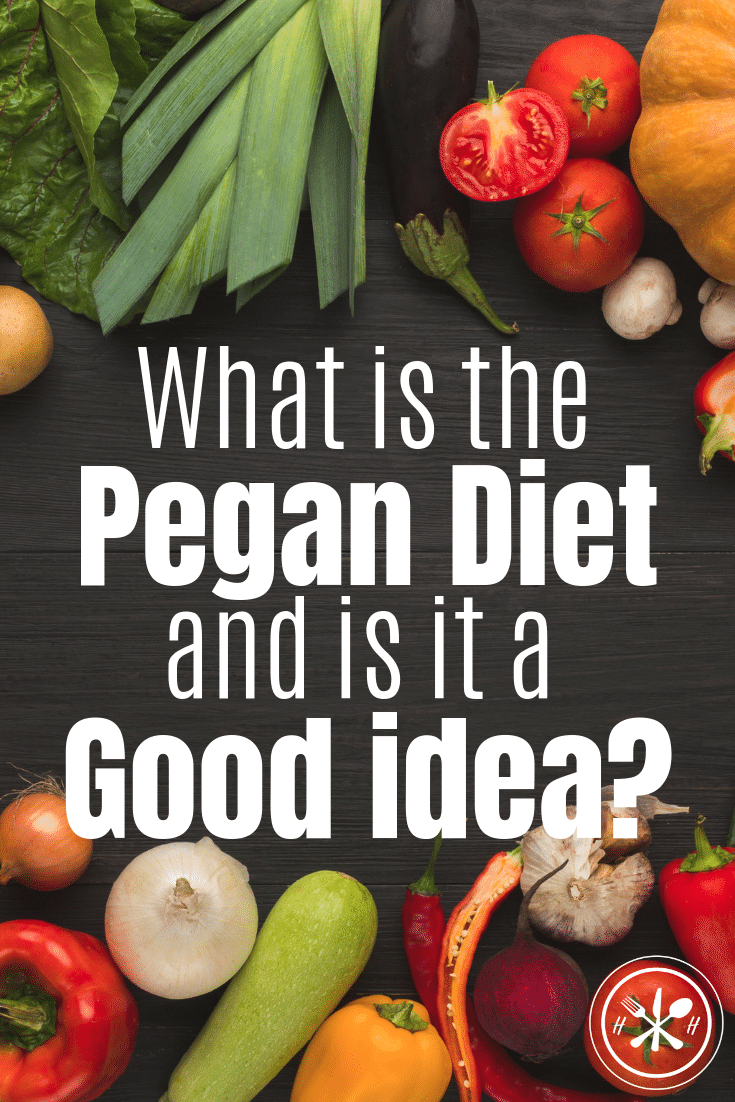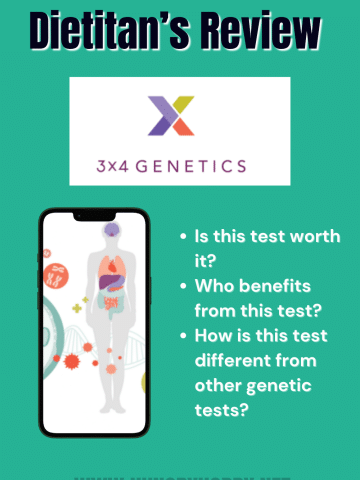Have you heard that the paleo diet and the vegan diet got together in a slightly scandalous relationship and produced a baby they named the pegan diet? It's true!
Ever since Mark Hyman published this blog post coining the term "pegan diet" or Paleo-Vegan, the pegan diet has risen in popularity and is now one of the top searched terms on Google and Pinterest.
I actually kind of thought it was a joke when I first heard the term "pegan diet." Immediately, I figured it was just a dairy-free gluten-free healthy diet and that is basically true, but that isn't the whole story.

Before we go any farther, let's do a quick little recap of the "parent" diets of this new fusion.
Paleo Diet aka "the caveman diet"
The paleo diet has a few guidelines:
- high in grass-fed meat, fish, poultry, vegetables, nuts, and seeds
- excludes intake of grains, legumes, dairy, and potatoes (except sweet potatoes)
The Vegan Diet
- high in vegetables, legumes, grains, nuts, and seeds
- excludes intake of all animal products including meat, fish, dairy, and honey
The Pegan Diet or Paleo-Vegan Diet
Dr. Hyman makes the point, which I 100% agree with, that so many "diets" have the same themes to them. Almost every diet (except keto - insert eye roll) emphasizes you should eat a billion vegetables and some fruits. They also emphasize limiting processed foods such as refined sugars and flour.
Dr. Hyman goes on to emphasize the following as part of the Pegan diet:
- organic and local
- high-quality grass-fed, pasture centered meats
- low mercury fish
My thoughts?
The organic and local thing, eh, I mean research hasn't shown that organic pesticides (yep, they still have pesticides on them) are any better than conventional. I try to eat the dirty dozen organic and leave it at that. Local is good, but I don't have time to hit up farmers markets every week so I don't stress about that either.
As for the meats thing, yes, I think meat quality is very important. Meat quality does affect the nutrition profile of the product (you can read about that here.) I think we are all overeating meat because it's too cheap (relative to prices around the rest of the world). Buy the good stuff and eat less of it.
As for the mercury level in fish, I agree on this point as well. Swordfish and other big fish probably shouldn't make up the majority of fish intake unless you want mercury poisoning.
Now for the more controversial recommendations:
1. Excluding dairy
- I've also been equal opportunity dairy and non-dairy if you can tolerate it then go for it. Why? The research is mixed, for every negative study I can find a positive one. I've included some resources below if you want to read further into that.
2. Excluding beans
- Beans have lectins in them that can cause digestive upset in some people.
My thoughts: First of all, sprouting can reduce lectin content. Second, not everyone is sensitive to lectins. If you aren't sensitive to lectins, then beans have been associated with numerous health benefits. If you are, like Mr. Hungry and many of my MRT/LEAP clients then you should avoid them. I don't like them (wish I did!), so I avoid them outside of hummus, chickpea pasta, and blondies. More resources below.
3. Stick with low glycemic grains
And I quote, "If you consume flours made from grains you might as well be drinking soda."
I think that is dead on because the blood sugar response will be similar whether you are consuming all-purpose flour (including gluten-free 1 to 1 flour) or soda.
But what about things like quinoa flour, brown rice flour, or my beloved oat flour? I don't think they are like drinking soda, but they aren't as healthy as eating unprocessed quinoa, brown rice or oats because the blood sugar response will be faster and more dramatic in flour versions (leading to weight gain.) Overall, I do tell my clients to eat things in their most unprocessed form aka original form.
Should You Follow This Diet?
I agree with many of his recommendations, but I found them hard to summarize because each recommendation has a stipulation to it. For example, limit beans - chose lentils only and avoid large starchy beans. Whaaatttt?????? Makes my head hurt trying to memorize it all.
I got the impression that he was recommending the diet that works for HIM personally. He even says it: this is how I eat. "I'm a Paleo-Vegan and you should be too." Sure, he is a trim looking guy with an MD, but just because it works for him doesn't mean it is the end all be all. He is an individual just like all of us which means you may prefer and tolerate certain food groups differently than him.
Overall, I found this diet to be more of a modified paleo diet that includes some grains and legumes then a paleo-vegan fusion. I like the basic tenants of this diet and the paleo diet for their focus on lots of unprocessed plant foods as well as the focus on blood sugar control when choosing starches. If you want to try and follow every single recommendation for all food groups, I don't think it will hurt you. I just think it will be annoying and difficult to remember which seems like it would be difficult to stick with long term.
Have you heard of the pegan diet? Do you eat paleo? vegan? or pegan?
Hungry Hobby "Pegan" Friendly recipes:
- Buffalo Butternut "Paleo" Hummus
- Healthy Fall Bacon Seared Salmon Salad
- Sheet Pan Sweet & Spicy Shrimp
- 5 Ingredient Spaghetti Squash Skillet
- Paleo Beef & Broccoli
- Gluten Free Quinoa Tabbouleh Salad
- Carne Asada Flank Steak Salad
- Paleo Mexican Breakfast Bowls
- Shrimp & Broccoli Omelet
- Pulled Pork Salad
- Health Paella
- Butternut Squash Pumpkin Soup
More Resources:
A big thanks to my intern, Mindy, for putting these resources together for this article and doing the bulk of the research!
Studies that support dairy as "unhealthy."
- https://www.ncbi.nlm.nih.gov/pubmed/23256145
- https://www.ncbi.nlm.nih.gov/pubmed/18065599
- https://www.ncbi.nlm.nih.gov/pubmed/17664905
- https://www.researchgate.net/publication/49660379_Impact_of_Antibiotic_Use_in_Adult_Dairy_Cows_on_Antimicrobial_Resistance_of_Veterinary_and_Human_Pathogens_A_Comprehensive_Review
Sources that support how dairy is healthy and advantageous:
- Dairy supports bone health, argues that dairy does not increase the risk of cardiovascular disease
- Dairy can be associated somewhat to weight loss management
- Proteins in dairy are readily and easily digested and absorbed, deeming dairy as metabolically advantageous
- Dairy intake associated with lower rates of cardiovascular disease
Meat should be a condiment and should be grass-fed
- Meat intake should be limited
- https://www.cancer.org/latest-news/world-health-organization-says-processed-meat-causes-cancer.html
- https://www.dur-a-avaler.com/wp-content/uploads/2013/02/Red%20meat%20consumption%20An%20overview%20of%20the%20risks%20and%20benefits.pdf
- https://jamanetwork.com/journals/jama/fullarticle/200150
- Meat is beneficial
- https://www.sciencedirect.com/science/article/pii/S0368131964800417
- This study investigates a group of people who eat high amounts of meats, discovers that they do not have high cholesterol and have no symptoms or indications of heart disease
- https://www.ncbi.nlm.nih.gov/pubmed/15927927
- Lean red meats do not have negative effects on one’s health
- https://www.ncbi.nlm.nih.gov/pubmed/20479151
- No association found b/w unprocessed meats and incidence of heart disease and diabetes -- only with processed meats
- https://www.ncbi.nlm.nih.gov/pubmed/20219103
- Benefits of grass fed beef
- https://academic.oup.com/ajcn/article/108/1/33/5036105
- Evidence of cardiometabolic benefits for overweight individuals who consume Mediterranean style diets with unprocessed, lean meats
- https://www.sciencedirect.com/science/article/pii/S0368131964800417
Limiting bean intake will reduce digestive issues according to Hyman:
- Hyman argues that individuals should limit bean intake to 1 cup a day max
- A study that supports Hyman’s claim
- https://www.ncbi.nlm.nih.gov/pubmed/15302522
- According to the above source, beans have lectin which leads one to have digestive issues
- Study that directly refutes this: https://www.ncbi.nlm.nih.gov/pmc/articles/PMC4573095/
-
- This source talks about a method known as “sprouting” which is known to reduce the negative effects of lectin in the body.
-
- https://www.ncbi.nlm.nih.gov/pubmed/15302522
-
- Other studies take a different approach on beans such as the one above, asserting that beans are healthy and should be a staple.
Related Posts from Hungry Hobby:
- What Is Carb Cycling & How Do You Do It?
- Are bananas bad for you?
- Are peanut butter and jelly sandwiches healthy?
- Are Cheat Meals Good For Weight Loss?
- Should you be taking collagen?
- Is Fasting Bad For You?
- Why 1200 Is Not The Right Number
- What Is The Best Weight Loss Program < —- read this before going on another diet!
- 10 Tips to Quit Late Night Snacking
- How to Detox the Right Way
- How to Handle Fluctuating Energy Levels






Brigid says
This isn't about the pegan diet but I wanted to get your thoughts on the recent news story that we should limit eggs to 2-3 per week. I feel like the info on eggs is constantly changing. What is the real story? TY
Kelli Shallal MPH RD says
Hi Brigid, do you still have the link to the story? I'm not sure why they would say limit them! The research on dietary cholesterol has disproven the idea that dietary cholesterol (as found in eggs) increases your blood levels of cholesterol. Therefore, there is no immediate reason to limit consumption of eggs. I would need to see the study to see why they were making that recommendation! Hope that helps! If you can find the study or news story link it here or email to kelli@hungryhobby.net Thanks!
Donna says
So, let me get this straight: y'all think we are OVER eating meat because IT'S TOO CHEAP? What the hell kinda drug are you taking lady? I don't know WHAT kinda grocery budget YOU have, but let me tell you! I am starting to practice making BEAN BURGERS AND LOAFS because "meat is so cheap" Where in the world do you live that you aren't horrified by the continued and consistent rise in the cost of meat? Or ANY grocery item for that matter. If this keeps up, I am gonna hafta teach myself how to make food from ground grass and tree bark. Oh. And the Cat O'Nines that grow in the ditches along our streets! Meat is too cheap. Wow. Tell that to all those single mothers trying to feed their little families and see how they respond.
Kelli Shallal MPH RD says
You have a very valid point about the rising cost of grocery overall, especially meat. I was raised by a single mother so I know all about living on food stamps. The point I was trying to make was that mass production of meat in low-quality facilities drives down both the cost and quality of the meat. This allows many families to eat more of then what might be healthy. The pegan diet (which I'm not endorsing, just sharing about) recommends high-quality meat but in condiment size portions. If you purchase this higher quality meat then you are spending the same amount of money but eating less meat with higher nutritional value. I was not trying to address the cost of meat or groceries overall which is a whole other concern and warrants an entire post dedicated to it. I do have a post on how to eat healthy on a budget you can read that here: https://hungryhobby.net/healthy-budget/